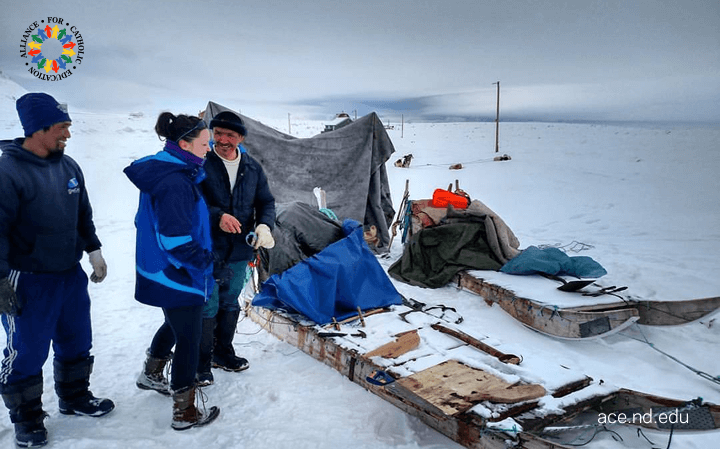To be an effective science teacher, the teacher must be a true scientist herself. This much is clear to Kelly McCarthy, a teacher and researcher who is one of 12 people recently named to the 2017-2018 Albert Einstein Distinguished Educator Fellowship Program. McCarthy, a physics, environmental science, and mathematics teacher at Our Lady of Lourdes Regional School in Coal Township, Pennsylvania, plans to use this experience working with federal STEM education policy as a way to inspire her students to become problem solvers in science.
 "For those of us who are in the classroom teaching students to make change in our world," says McCarthy, "it's really important for us to have authentic experiences to bring back to our students."
"For those of us who are in the classroom teaching students to make change in our world," says McCarthy, "it's really important for us to have authentic experiences to bring back to our students."
As an Einstein Fellow, McCarthy will take a leave of absence from teaching to spend the next 11 months in Washington, D.C., to work for the National Science Foundation's (NSF) geoscience team.
"I'm excited about every part of it," McCarthy says, "but for me the biggest deal is to be in a position to see how education policy is passed at the federal level."
Specifically, McCarthy's work will help determine how the NSF can better leverage grants to involve more students of low-income backgrounds in STEM education.
McCarthy's desire to make education more accessible began at Penn State University, where she studied physics and math. Here, McCarthy decided that she wanted to have an impact on the community beyond the lab, so she agreed to teach in Philadelphia through Teach for America. In serving an under-resourced, underrepresented student population, McCarthy says she saw the value in bringing the resources to a community that doesn't always have access to STEM careers.
After completing her service with Teach for America, McCarthy returned to her hometown to continue sharing her deep love for science. Here, McCarthy found that her students connected with the material more readily when she provided examples of how scientists applied the content to their careers. In her classroom, McCarthy gives students an opportunity to connect with people that are doing scientific research in real life, whether that is getting people to chat with scientists in the field or bringing up a local problem that is relevant to students. The ultimate aim is for her students to "think about how to solve real world problems they walk past everyday," she says.
To this end, McCarthy saw value not only in connecting her students with professional scientists, but also in exploring scientific inquiries of her own. As a 2016 PolarTREC teacher, McCarthy embarked on a 30-day polar expedition and conducted research for NASA's Operation IceBridge. In 2017, McCarthy was named a National Geographic Grosvenor Teacher Fellow (GTF), which allowed her the opportunity to conduct geographic research aboard the Lindblad-National Geographic fleet.
"For those of us who are in the classroom teaching students to make change in our world, it's really important for us to have authentic experiences to bring back to our students."
"The polar regions, those are some of the most remote areas on our planet, so having the experience of being there and doing research, and then being a part of the fellowship that does national research…helped me figure out on a small level how I can make those concepts really relatable to my students," McCarthy said. "And, on a bigger level, they helped me understand other leadership roles that I can take that can have an impact as well."
One of the leadership roles that led McCarthy to the Einstein Fellowship was her work as a Notre Dame Trustey Family STEM Teaching Fellow. In this position, McCarthy served as one of three teachers from her school who connects regularly with Dr. Matt Kloser, the director of the center, and other STEM educators. The team also attends an institute on Notre Dame's campus each summer over the course of three years.
From polar expeditions to teacher mentoring, each experience has played an essential part in McCarthy's journey to the Einstein Fellowship. "With more experiences," she says, "you find more opportunities that align with what you are doing,"
As for the coming months, McCarthy foresees that the Einstein Fellowship will afford her the ability to "zoom out of one classroom and community" and gain an understanding of how what she does in the classroom fits into the "bigger puzzle" of STEM education. However, she also hopes that her participation in the program might influence her students to seek out similar leadership roles.
"Ultimately," says McCarthy, "what I hope comes out of my teaching is that each of my students will find their own desire to learn and understand the world, and with that desire, be able to solve problems that arise, and become our next leaders and innovators."
 Alliance for Catholic Education
Alliance for Catholic Education
